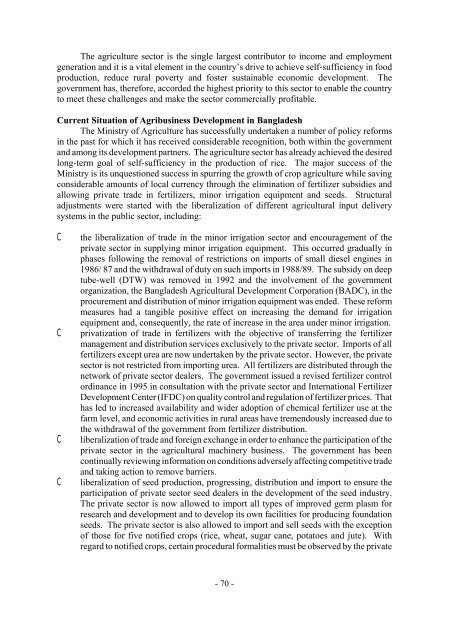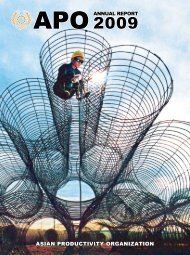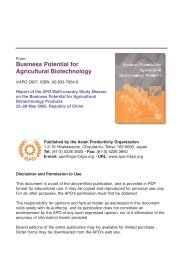Development of Agribusiness Enterprises - Asian Productivity ...
Development of Agribusiness Enterprises - Asian Productivity ...
Development of Agribusiness Enterprises - Asian Productivity ...
You also want an ePaper? Increase the reach of your titles
YUMPU automatically turns print PDFs into web optimized ePapers that Google loves.
The agriculture sector is the single largest contributor to income and employment<br />
generation and it is a vital element in the country’s drive to achieve self-sufficiency in food<br />
production, reduce rural poverty and foster sustainable economic development. The<br />
government has, therefore, accorded the highest priority to this sector to enable the country<br />
to meet these challenges and make the sector commercially pr<strong>of</strong>itable.<br />
Current Situation <strong>of</strong> <strong>Agribusiness</strong> <strong>Development</strong> in Bangladesh<br />
The Ministry <strong>of</strong> Agriculture has successfully undertaken a number <strong>of</strong> policy reforms<br />
in the past for which it has received considerable recognition, both within the government<br />
and among its development partners. The agriculture sector has already achieved the desired<br />
long-term goal <strong>of</strong> self-sufficiency in the production <strong>of</strong> rice. The major success <strong>of</strong> the<br />
Ministry is its unquestioned success in spurring the growth <strong>of</strong> crop agriculture while saving<br />
considerable amounts <strong>of</strong> local currency through the elimination <strong>of</strong> fertilizer subsidies and<br />
allowing private trade in fertilizers, minor irrigation equipment and seeds. Structural<br />
adjustments were started with the liberalization <strong>of</strong> different agricultural input delivery<br />
systems in the public sector, including:<br />
C the liberalization <strong>of</strong> trade in the minor irrigation sector and encouragement <strong>of</strong> the<br />
private sector in supplying minor irrigation equipment. This occurred gradually in<br />
phases following the removal <strong>of</strong> restrictions on imports <strong>of</strong> small diesel engines in<br />
1986/ 87 and the withdrawal <strong>of</strong> duty on such imports in 1988/89. The subsidy on deep<br />
tube-well (DTW) was removed in 1992 and the involvement <strong>of</strong> the government<br />
organization, the Bangladesh Agricultural <strong>Development</strong> Corporation (BADC), in the<br />
procurement and distribution <strong>of</strong> minor irrigation equipment was ended. These reform<br />
measures had a tangible positive effect on increasing the demand for irrigation<br />
equipment and, consequently, the rate <strong>of</strong> increase in the area under minor irrigation.<br />
C privatization <strong>of</strong> trade in fertilizers with the objective <strong>of</strong> transferring the fertilizer<br />
management and distribution services exclusively to the private sector. Imports <strong>of</strong> all<br />
fertilizers except urea are now undertaken by the private sector. However, the private<br />
sector is not restricted from importing urea. All fertilizers are distributed through the<br />
network <strong>of</strong> private sector dealers. The government issued a revised fertilizer control<br />
ordinance in 1995 in consultation with the private sector and International Fertilizer<br />
<strong>Development</strong> Center (IFDC) on quality control and regulation <strong>of</strong> fertilizer prices. That<br />
has led to increased availability and wider adoption <strong>of</strong> chemical fertilizer use at the<br />
farm level, and economic activities in rural areas have tremendously increased due to<br />
the withdrawal <strong>of</strong> the government from fertilizer distribution.<br />
C liberalization <strong>of</strong> trade and foreign exchange in order to enhance the participation <strong>of</strong> the<br />
private sector in the agricultural machinery business. The government has been<br />
continually reviewing information on conditions adversely affecting competitive trade<br />
and taking action to remove barriers.<br />
C liberalization <strong>of</strong> seed production, progressing, distribution and import to ensure the<br />
participation <strong>of</strong> private sector seed dealers in the development <strong>of</strong> the seed industry.<br />
The private sector is now allowed to import all types <strong>of</strong> improved germ plasm for<br />
research and development and to develop its own facilities for producing foundation<br />
seeds. The private sector is also allowed to import and sell seeds with the exception<br />
<strong>of</strong> those for five notified crops (rice, wheat, sugar cane, potatoes and jute). With<br />
regard to notified crops, certain procedural formalities must be observed by the private<br />
- 70 -
















